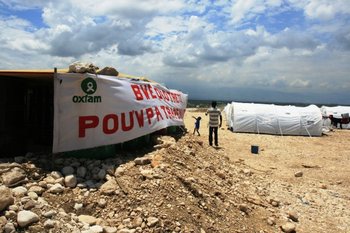Paul Knox Clarke is writing this blog in a personal capacity. He has asked us to point out that he worked as a consultant for Oxfam GB in the past, and that his wife works for Oxfam International.
Unless you have been far from the media for the last two weeks, you can’t fail to have read, seen, thought and probably talked about the Haiti prostitution scandal. The whole thing might make you feel equally angry, sad and sick. If the last thing that you want to do now is read a blog on it, I fully understand. Thanks for coming this far. But yesterday I had a conversation with a very well informed and intelligent journalist, and I wanted to share some of my reflections on that conversation.
First of all, what happened in Haiti? A number of Oxfam staff – including the country director – paid women for sex. In doing so, they broke Haitian law. Prostitution was, and is, illegal in Haiti. The laws were only lightly enforced, and prostitution remained a “widespread practice” according to the US Department of State. But in breaking the law, the aid workers showed the worst, most crass, cavalier attitudes to the state – ignoring its legitimacy, rather than helping and supporting it to deal with an appalling situation. It’s a common complaint of many countries that host humanitarians, and in this case entirely justified. More than this, the individuals involved showed a real absence of integrity, morality and understanding of their role. Whether or not the women involved were direct recipients of aid (and I don’t think that there is any evidence that they were?) the staff exploited the economic power and status that they enjoyed to engage in transactional sex while working for an organisation that champions the rights of women.
In response, Oxfam initiated an investigation, which led to four staff being dismissed. Three, including the country director, resigned before the end of the investigation. Oxfam took legal advice in Haiti on whether the crimes should be reported to the police and were told that it was extremely unlikely that any action would be taken if they did so. Back in the UK, Oxfam reported their action to the regulator, who said that the organisation had taken appropriate action. The organisation also kept the donors informed, and issued two press releases (see here and here). Whatever else this was, it wasn’t a cover-up.
Fast forward seven years and Oxfam is receiving a comprehensive kicking in the media and the court of public opinion.
What can we learn from this, that can help to address long running problems with accountability?
1. We can use the public’s anger to keep the sector honest.
The general public, who directly or indirectly pay for most humanitarian action, cares deeply about NGO behaviour. People expect agencies and the people who work for them to keep to basic standards of morality. They expect agencies to hold their staff to account if they don’t.

Photo credit: Flickr/ Oxfam International
And so the public can keep us honest, and keep us to the standards – especially standards of behaviour and accountability to affected people – to which 99.9% of humanitarian workers would expect to be held.
2. We need to better communicate what we do.
If we wish to use the tremendous benefit of popular engagement in, and support for, our work, then we need to communicate that work better. Sure, there are a large number of media outlets with an explicit anti-aid agenda. I’m not talking about them. But there are also (still) a lot of thoughtful, balanced, critical journalists writing for thoughtful, balanced, critical people. And they deserve more than ‘people are dying but our heroes can save them for five pounds’. We shouldn’t be scared to explain the realities, difficulties, opportunities and trade-offs involved. This will – in the long term – help the public to hold us to account in a more effective way.
3. The media matter.
Accountability based on a compassionate but critical donor public also requires the media to look beyond the sensational. Journalists should consider whether the way that they report is helping achieve better support to poor and marginalised people, or whether it is making this harder, in the name of a good story. In this case, Oxfam has been attacked partly because it made serious mistakes (rehiring one of the individuals) and largely because it took action to hold staff to account. I am willing to bet that among the thousands of aid workers in Haiti (many from less well-regulated organisations than Oxfam) there were at least a few other examples of gross misconduct. But they weren’t addressed, reported to the charity commission or made the subject of press releases. As a result, they are not making headlines now. It’s hard to see how the media alleging that Oxfam’s press releases were some sort of cover up are advancing the cause of accountability. Rather, Oxfam is being punished for trying to do the right thing.
4. Let’s be clear about accountability.
It’s not just the public who need to be clear on the realities and complexities of accountability. In humanitarian circles, the term has become a catch-all for a host of different problems and activities: the participation of affected people in decision making; communication with ‘beneficiaries’; feedback on programme quality; prevention of sexual exploitation – all get bundled together into a single muddy and muddled idea. This is not helpful if we want to make improvements. While they all share the common denominator of power inequality, these are different challenges and require different solutions. It’s time for us humanitarians to stop wringing our hands about ‘accountability’ and be more precise, detailed and solution-focused.
5. We need enforcement in the absence of the rule of law.
We should begin by finding solutions to the really bad stuff. The rare but disgusting situations where aid workers do things that hurt the people they are there to serve, or which damage the mission: abuse; fraud; criminal negligence. ‘Accountability’ in these situations means sanctioning the perpetrator, and providing some recompense or closure to the victim. This would normally be the function of the legal system. The problem is that much humanitarian work – almost by definition – occurs in places where the state, and so the rule of law, is weak or non-existent.
What can be done in these situations? Some countries can prosecute their citizens for certain crimes (notably sexual abuse of minors) that occur overseas. This might be one route: agencies, at the very least, should be aware of these laws, and ready to take a proactive role in assisting with prosecutions where there is evidence that their staff have broken the law.
But it’s not a magic bullet – many crimes are not covered, and prosecution in the staff member’s home country may further erode the agency of the affected state. Another route is a humanitarian ‘license to practise’. Some professions – such as the medical profession – can remove an individual’s right to practise for professional misconduct. Here, the sanction is loss of status and livelihood, and it can be imposed for a broad range of actions, including things which are immoral, but not illegal. This approach might also be useful for humanitarians: some of the anger directed at Oxfam relates to the fact that the staff were later re-employed, or were employed by other agencies.
What is clear is that the humanitarian sector needs to act quickly and forcefully to address the specific issue of gross misconduct. The humanitarian context makes solutions difficult, but this is no excuse for waiting. Public anger can help this to happen now, and can serve as a powerful tool to keep us honest and accountable in the future. But to capitalise on the public’s desire for us to be as good as we should be we need to focus, get past the simple, fairy-tale messages, and ask our counterparts in the media whether they want to prioritise entertainment – or accountability.

